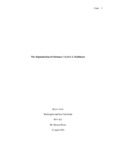| dc.rights.license | In Copyright | en_US |
| dc.creator | Crew, Briyce Dawson | |
| dc.date.accessioned | 2021-06-01T15:43:05Z | |
| dc.date.available | 2021-06-01T15:43:05Z | |
| dc.date.created | 2021 | |
| dc.identifier | WLURG38_Crew_POV_2021 | |
| dc.identifier.uri | http://hdl.handle.net/11021/35379 | |
| dc.description | Capstone; [FULL-TEXT FREELY AVAILABLE ONLINE] | en_US |
| dc.description | Bryce Dawson Crew is a member of the Class of 2021 of Washington and Lee University. | en_US |
| dc.description.abstract | DRUGS. The word evokes a broad array of mental images: pills, syringes, controlled substances, abuse, treatment, professionals, science, and crime. It is almost impossible for people living in the United States to go their whole lives without consuming human-created or extracted chemical substances, whether in caffeinated or alcoholic beverages, medications or unofficial substances. Many stereotypes, stigmas, and connotations persist around these substances, their method of use, and those affiliated with their creation, distribution, and use. There is no doubt the U.S. government's War on Drugs, societal norms, and our education system have directed our understanding and perception around substance use and its effects. This extends to providers and patients in our healthcare system which both deal with prevalent official and unofficial substance use. Healthcare providers have to compile a host of information to institute a treatment plan for their specific patient. However, their treatment plan may be tainted from accrued stigmas about their patients' lifestyles, lived experiences, features or demeanors. Although all these factors can provide a wealth of knowledge to the provider, they do not always need to impact the treatment. This uncertainty of motivation and its effects around diagnoses and treatment is where our problem starts. It is the goal of this paper to explore the ways the stigmas associated with substance use pervade the United States Healthcare system and to complicate the current perspective of the treatment and diagnoses of these related conditions. [From Introduction] | en_US |
| dc.description.statementofresponsibility | Bryce Crew | |
| dc.format.extent | 29 pages | en_US |
| dc.language.iso | en_US | en_US |
| dc.rights | This material is made available for use in research, teaching, and private study, pursuant to U.S. Copyright law. The user assumes full responsibility for any use of the materials, including but not limited to, infringement of copyright and publication rights of reproduced materials. Any materials used should be fully credited with the source. | en_US |
| dc.rights.uri | http://rightsstatements.org/vocab/InC/1.0/ | en_US |
| dc.subject.other | Washington and Lee University, Shepherd Poverty Program | en_US |
| dc.title | The Stigmatization of Substance Use in U.S. Healthcare | en_US |
| dc.type | Text | en_US |
| dcterms.isPartOf | RG38 - Student Papers | |
| dc.rights.holder | Crew, Briyce Dawson | |
| dc.subject.fast | Substance abuse -- Treatment | en_US |
| dc.subject.fast | Stigma (Social psychology) | en_US |
| dc.subject.fast | Medical care | en_US |
| dc.subject.fast | Discrimination | en_US |
| local.department | Shepherd Poverty Program | en_US |
| local.scholarshiptype | Capstone | en_US |
